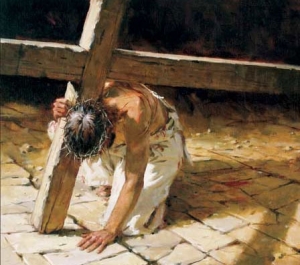(An excerpt from The Pursuit of God by A.W. Tozer, Chapter 2:)
Our woes began when God was forced out of His central shrine and “things” were allowed to enter. Within the human heart “things” have taken over. Men have now by nature no peace within their hearts, for God is crowned there no longer, but there in the moral dusk stubborn and aggressive usurpers fight among themselves for first place on the throne.
This is not a mere metaphor, but an accurate analysis of our real spiritual trouble. There is within the human heart a tough fibrous root of fallen life whose nature is to possess, always to possess. It covets “things” with a deep and fierce passion. The pronouns “my” and “mine” look innocent enough in print, but their constant and universal use is significant. They express the real nature of the old Adamic man better than a thousand volumes of theology could do. They are verbal symptoms of our deep disease. The roots of our hearts have grown down into things, and we dare not pull up one rootlet lest we die. Things have become necessary to us, a development never originally intended. God’s gifts now take the place of God, and the whole course of nature is upset by the monstrous substitution.
Our Lord referred to this tyranny of things when He said to His disciples, “If any man will come after me, let him deny himself, and take up his cross, and follow me. For whosoever will save his life shall lose it: and whosoever shall lose his life for my sake shall find it.”
Breaking this truth into fragments for our better understanding, it would seem that there is within each of us an enemy which we tolerate at our peril. Jesus called it “life” and “self,” or as we would say, the selflife. Its chief characteristic is its possessiveness: the words “gain” and “profit” suggest this. To allow this enemy to live is in the end to lose everything. To repudiate it and give up all for Christ’s sake is to lose nothing at last, but to preserve everything unto life eternal. And possibly also a hint is given here as to the only effective way to destroy this foe: it is by the Cross. “Let him take up his cross and follow me.”
The way to deeper knowledge of God is through the lonely valleys of soul poverty and abnegation of all things. The blessed ones who possess the Kingdom are they who have repudiated every external thing and have rooted from their hearts all sense of possessing. These are the “poor in spirit.” They have reached an inward state paralleling the outward circumstances of the common beggar in the streets of Jerusalem; that is what the word “poor” as Christ used it actually means. These blessed poor are no longer slaves to the tyranny of things. They have broken the yoke of the oppressor; and this they have done not by fighting but by surrendering. Though free from all sense of possessing, they yet possess all things. “Theirs is the kingdom of heaven.”




 Posted by Rigoberto Dominguez
Posted by Rigoberto Dominguez